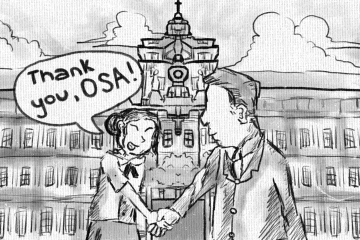
GOING BACK to normal after a stretched time indoors should be exciting, but “normal” has always been different for us women.
It does not always mean “okay.” Merriam-Webster would characterize normal as “usual, typical, or routine.” It is expected, something adhering to a pattern. And the pattern is this: when women go out on their own, fear creeps in. A lot of times, the feeling becomes a premonition.
There had been a pause to the transgressions that the streets constantly witnessed, mostly because they became empty. As most were restricted to their homes, it became safer, at least on the streets.
However, as we gradually come closer to the kind of life we knew before the pandemic, the issue resurfaces.
This story goes on repetitively in a seemingly endless plot, still without a denouement.
We feel the eyes first. We have been told many times to never make eye contact with strangers. Even so, our peripheral vision catches what our center of gaze cannot.
We feel next the red blooming on our cheeks, the unease and vexation bubbling together into a complex flush. Flattery would be a nice feeling—almost like a privilege that dread has made impossible because of what usually happens after.
We hear. It is an unwelcome greeting at times. Other times it is names that we are deplorably given, “babe” or “ganda.” Some men are more creative at being discreet by whistling. Regardless of manner, they are all the same. It is street harassment.
The perpetrators are fully capable of defending themselves. They minimize their crime as simple flirting or giving of compliments. Totally harmless.
However, it is unsolicited; no one can take such things as compliments. The unwelcome is always a disturbance. It trespasses, barging into a sacred, personal bubble supposedly consisting of some degree of peace.
It is uncomfortable and terrifying. No feelings are negative, and indeed, these two are normal experiences for everyone. Yet for women, these have grown from feelings to a shared reality that we have to live with daily, and we should not have to.
It is a derogation, even dehumanizing. What it does is take our bodies for objects of pleasure. Our faces, limbs, and skin are taken apart by their gazes to be examined until, to them, we are no longer humans—not their equals. Their minds mistake us for breathing, life-sized dolls and we are treated as such.
So it is fallacious to think that catcalling merely inconveniences women, that it terrifies us only for a bearable span of time before we come out unscathed.
The “normalcy” of street harassment has long been dictating how women must live, that we must have a man on our side or save enough of our allowance for the luxury of a taxi ride. We are supposed to tweak our lives, the victims. It speaks, too, of a message that we have long been told: the world is not for a woman. It is not a place for us to be comfortable nor to simply live in. Yet we refuse to accept this message.
It should not take a pandemic to ensure safety on the streets, to tame the barbarity. What it should take is realization, understanding of the depths that the issue pervades and awareness enough for perpetrators to stop.
There is a long way to go before we even come close to the possibility of harassment-free streets. Still, we women dream with and for the little ones who are already exposed to the same atrocities.
We dream of an afternoon walk in solitude, enjoying the orange sunset glow after a long, tiring day at school or work. A man or two would pass by, but they mind their own business. We reach home, bearing no wounds from the short walk.
We dream of a proper denouement for street harassment. F
Editor’s note: This article was originally published in Vol. 58, Issue No. 1 of the Flame. View the entire issue through this link.



